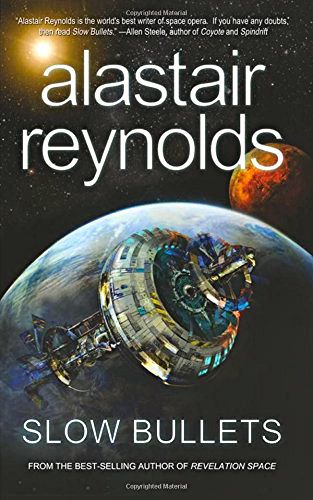Alastair Reynolds, Slow Bullets
reviewed by Danielle L. Parker

Slow Bullets Publisher: Tachyon Publications. 2015 Length: 192 pp. ISBN: 1616961937; 978-1616961930 |
I’ve tried a number in the sub-genre. Timothy Zahn and John Scalzi were readable, but not my thing. The gratuitous carnage in another author’s work made me angry. Many others simply couldn’t hold my interest. When it comes right down to it, I find shoot-ups for the sake of shoot-ups, on screen or on page, boring.Few writers convey the feeling of war itself.
War evokes from its participants both the highest sacrifice and, as the flip side of the same coin, the greatest brutality that humans are capable of. No opera has such a grand palette of emotions to work from. To focus on the bang-bang demolition aspect of war is like playing Wagner on a tinny two-tone scale. It’s a joke.
Slow Bullets begins with Scur, a soldier fighting a war that Jonathan Swift would have recognized. The issues in this large-end-of-the-egg, small-end-of-the-egg conflict are intensely felt by the participants and meaningless to outsiders.
Scur falls into the hands of a war criminal from the other side. Before his cruel “slow bullet” kills her, she wakes up on a prison ship. The ship is filled with war criminals, including her nemesis, Orvin. Scur herself just might be a war criminal with a false memory and identity. She doesn’t care. Her one goal is killing Orvin.
But what could have been a simple revenge scenario expands into a ship lost in space and time, with mysterious, civilization-eradicating aliens, old enemies forced to forgive and forget, and a chance at salvation in the classic way: self-sacrifice and kindness.
Slow Bullets is hardly longer than a novella. It has few bang-bang demolitions. But Reynolds wasn’t playing the two-tone scale, he banged away at the cathedral organ instead. This is not military science fiction, this is war opera. Recommended!
Copyright © 2015 by Danielle L. Parker

